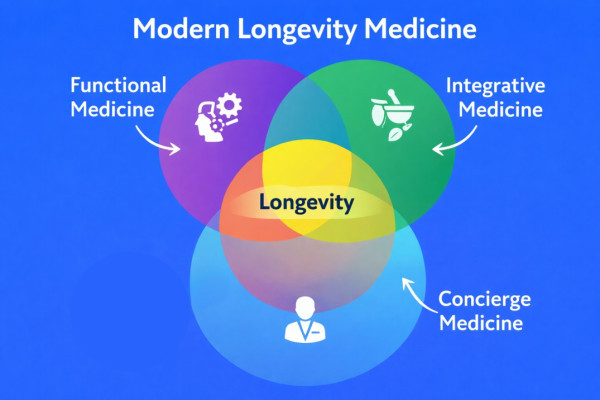Longevity Doctors: Who They Are, How They're Certified, and How to Assess Them

By Brent | Last Updated: March 26th, 2026
What Is a Longevity Doctor and How Do You Choose the Right One?
A growing number of people want to live longer. More importantly, they want to stay functional, independent, and cognitively sharp for as long as possible.
That demand has exposed a gap in traditional healthcare.
Most physicians are trained to diagnose disease, manage symptoms, and maintain baseline health. Preventing decline decades in advance or actively optimizing healthspan has historically not been the core mission of medicine. As a result, a new category has emerged: longevity doctors.
Key Takeaways
> A longevity doctor is a licensed, board-certified physician who focuses on healthspan, prevention, and long-term biological resilience.
> They differ from functional medicine (an approach) and concierge medicine (a delivery model) by their specific focus on aging and longevity.
> There is no single "longevity medicine" specialty, but many physicians pursue additional training in anti-aging, regenerative, or functional medicine.
> Costs range from insurance-covered visits to several thousand dollars annually for comprehensive programs.
> Longevity doctors complement longevity coaches—doctors diagnose and prescribe; coaches help with implementation.
What Is a Longevity Doctor?
A longevity doctor is a licensed, board-certified physician who focuses their practice on healthspan, prevention, and long-term biological resilience.
They still practice medicine. They can diagnose conditions, order and interpret labs, and prescribe medication when appropriate. The difference is orientation.
Longevity doctors prioritize:
> Early detection of risk factors
> Root-cause analysis instead of symptom suppression
> Lifestyle, metabolic, and systems-level interventions
> Long-term outcomes rather than short-term fixes
This approach aligns with the broader shift toward preventive and lifestyle-based medicine, which has been shown to reduce chronic disease burden and premature mortality (CDC).
Quick Answer: A longevity doctor is a licensed physician who focuses on healthspan optimization, prevention, and long-term biological resilience rather than reactive disease treatment. They practice medicine (can diagnose and prescribe) but prioritize early detection, root-cause analysis, and lifestyle interventions. There's no single "longevity medicine" specialty—most pursue additional training in functional, integrative, or anti-aging medicine. Costs range from insurance-covered visits to $3,000-15,000+ annually for comprehensive programs. Find them through our city guides or longevity clinics.
What’s the Difference Between a Longevity Doctor, Functional Medicine, and Concierge Care?
These terms are often used interchangeably, but they are not the same.
|
Type |
Definition |
Focus |
Key Distinction |
|
Longevity Doctor |
Licensed physician focused on healthspan and aging |
Prevention, biological age, long-term resilience |
Goal-oriented (optimizing how you age) |
|
Functional Medicine Doctor |
Physician using systems biology to find root causes |
Root-cause analysis, personalized testing |
Approach-oriented (how they practice) |
|
Integrative/Holistic Doctor |
Combines conventional + complementary medicine |
Whole-person care |
Philosophy-oriented |
|
Concierge Doctor |
Extended access, longer visits, membership model |
Better access and service |
Delivery model (business structure) |
|
Primary Care Physician |
General medical care, referrals |
Baseline health maintenance |
Reactive, not preventive-focused |
Functional medicine doctors focus on identifying root causes of disease using systems biology and personalized testing. Many longevity doctors come from this background.
Integrative or holistic doctors combine conventional medicine with evidence-informed complementary approaches.
Concierge doctors primarily change the delivery model, offering longer visits and better access, but may still practice conventional, reactive care.
A longevity doctor may practice functional or integrative medicine and may also operate a concierge model, but longevity is defined by the goal, not the business structure.

What Services Do Longevity Doctors Offer?
Longevity practices vary, but most offer a deeper and more proactive level of care than standard primary care.
Common Services
|
Service Category |
What's Included |
Why It Matters |
|
Comprehensive Testing |
Blood panels, metabolic markers, hormone panels |
Baseline assessment, early detection |
|
Cardiovascular Assessment |
Advanced lipid testing, calcium scoring, vascular imaging |
Heart disease is #1 killer |
|
Hormonal Optimization |
Thyroid, testosterone, estrogen, cortisol |
Hormones decline with age |
|
Biological Age Testing |
Epigenetic clocks, telomere testing |
Measures aging rate vs. calendar age |
|
Advanced Imaging |
Preventative MRI, full-body scans |
Early cancer/disease detection |
|
Lifestyle Medicine |
Nutrition, exercise, sleep, stress protocols |
Foundation of longevity |
|
Supplement/Medication |
Evidence-based supplements, peptides, off-label Rx |
Targeted interventions |
|
Ongoing Monitoring |
Regular check-ins, plan adjustments |
Course correction over time |
Research increasingly supports personalized, lifestyle-driven interventions for improving cardiometabolic and long-term health markers.
Not every patient needs advanced testing, but longevity doctors tend to look earlier and more broadly than traditional care models.
How Are Longevity Doctors Certified?
This is where things get nuanced.
There is currently no single, government-recognized specialty called "longevity medicine." Any licensed physician can technically market themselves as a longevity doctor.
That said, many pursue additional training and credentials.
Common Backgrounds and Certifications
|
Credential/Training |
Description |
|
MD or DO |
Required foundation—must be licensed physician |
|
Board Certification (Primary) |
Family medicine, internal medicine, endocrinology, cardiology |
|
Functional Medicine |
Institute for Functional Medicine (IFM) certification |
|
Anti-Aging/Regenerative |
Various organizations offer fellowship programs |
|
Integrative Medicine |
Board certification available through ABOIM |
|
Metabolic/Obesity Medicine |
ABOM certification |
|
Continuing Education |
Courses in aging biology, epigenetics, prevention |
The key point: Longevity doctors are already licensed physicians first. Any additional longevity-focused training supplements their medical foundation—it does not replace it.
What Should You Look for When Choosing a Longevity Doctor?
|
Green Flags |
Red Flags |
|
Active medical license in good standing |
No verifiable medical credentials |
|
Clear about training and certifications |
Vague about background |
|
Explains what they do AND don't do |
Makes promises about outcomes |
|
Collaborates with other specialists |
Discourages seeing other doctors |
|
Evidence-based approach |
Relies heavily on unproven therapies |
Do You Need a Longevity Coach or a Longevity Doctor?
This depends on your situation.
|
Need |
Longevity Coach |
Longevity Doctor |
|
Behavior change, accountability |
✅ Primary role |
May assist |
|
Lifestyle implementation |
✅ Primary role |
Provides guidance |
|
Habit formation, consistency |
✅ Primary role |
May refer to coach |
|
Medical diagnosis |
❌ Cannot do |
✅ Primary role |
|
Lab ordering and interpretation |
❌ Cannot do |
✅ Primary role |
|
Prescription medications |
❌ Cannot do |
✅ Primary role |
|
Advanced testing |
❌ Cannot do |
✅ Primary role |
|
Unexplained symptoms |
Refer to doctor |
✅ Primary role |
A longevity coach focuses on behavior change, accountability, and lifestyle implementation. They do not diagnose or prescribe.
A longevity doctor practices medicine. They are essential when:
> Symptoms are unexplained or persistent
> Lab work needs deeper interpretation
> Medication or medical testing is required
> You suspect an underlying condition rather than a habit gap
In many high-quality longevity practices, doctors and coaches work together. The doctor identifies what needs attention. The coach helps ensure it actually happens.
Many longevity clinics integrate both roles under one roof.
How Do You Evaluate a Longevity Doctor Before Working With Them?
Because the field is still evolving, discernment matters.
Evaluation Criteria
|
Category |
Questions to Ask |
|
Medical Credentials |
Are they a licensed physician in good standing? What's their primary specialty? |
|
Scope Clarity |
Do they clearly state what they do and don't treat? Do they refer when needed? |
|
Assessment Depth |
Do they ask about lifestyle, sleep, stress, history, and goals? |
|
Lab Strategy |
Are tests purposeful, not excessive or random? Do they explain why each test matters? |
|
Process |
Is there a clear follow-up and interpretation plan? How often do you meet? |
|
Relationship Fit |
This is long-term care. Do you trust them? Can you communicate openly? |
Longevity medicine is highly personalized. Outcomes depend as much on partnership as protocol.
What Questions Should You Ask Before Choosing a Longevity Doctor?
> What is your medical training and background?
> What additional longevity-specific training have you completed?
> How do you approach patients who are healthy but want to optimize?
> What testing do you typically recommend, and why?
> How do you stay current on longevity research?
> What does ongoing care look like after initial assessment?
> Do you work with coaches or other practitioners?
> What's your philosophy on medications vs. lifestyle interventions?
How Much Does a Longevity Doctor Cost?
Costs vary widely and depend on insurance participation.
Cost Breakdown
|
Service Type |
Typical Cost Range |
Insurance Coverage |
|
Initial consultation |
$250-1,000 |
Sometimes covered |
|
Comprehensive intake (2-4 hours) |
$1,500-5,000 |
Rarely covered |
|
Follow-up visits |
$150-500 |
Sometimes covered |
|
Basic blood work |
$200-500 |
Often covered |
|
Advanced testing (epigenetic, hormones) |
$500-3,000 |
Rarely covered |
|
Preventative imaging |
$1,000-10,000 |
Rarely covered |
|
Annual program (comprehensive) |
$5,000-25,000+ |
Rarely covered |
|
Annual program (basic) |
$1,500-5,000 |
Partially covered |
Payment models:
> Insurance-based: Some longevity doctors accept insurance for standard services, with additional testing or programs billed separately
> Cash-pay/Direct Primary Care: Monthly or annual membership fee covering visits, with testing billed separately
> Comprehensive programs: All-inclusive annual fee covering testing, visits, and ongoing monitoring
Many services may be eligible for HSA or FSA use. Check with your plan.
Higher cost does not automatically mean better care. What matters is appropriateness, transparency, and follow-through.
How Do You Find a Longevity Doctor Near You?
Finding a qualified longevity doctor can be challenging, especially locally. Here are your options:
City-Specific Guides
We've compiled guides to longevity doctors in major cities:
United States:
> Austin
> Boston
> Chicago
> Miami
> Seattle
International:
> Bangkok
> Dubai
> London
> Paris
> Sydney
Other Options
> Longevity Clinics: Comprehensive facilities offering doctors, testing, and sometimes coaching under one roof
> Longevity Retreats: Immersive programs combining medical assessment with lifestyle intervention
> Telemedicine: Many longevity doctors offer remote consultations, making geography less of a barrier
> Browse our marketplace: Search for clinics and providers by location and specialty
How Can You Evaluate Local Longevity Doctor Options?
If you're searching on your own:
> Ask your current physician what preventive services they already offer
> Search for licensed physicians with functional or integrative training
> Look for practices that emphasize prevention, not promises
> Verify credentials through state medical boards
> Read reviews but prioritize process and fit over testimonials
What Other Specialists Might Work With a Longevity Doctor?
Longevity medicine often intersects with other specialties:
|
Specialist |
When to Consider |
Relationship to Longevity Doctor |
|
Cardiologist |
Heart disease risk, advanced cardiac testing |
May refer for specialized care |
|
Endocrinologist |
Complex hormonal issues |
May collaborate on hormone optimization |
|
Longevity Coach |
Behavior change, accountability |
Often works alongside |
|
Nutritionist/Dietitian |
Detailed diet planning |
May refer or include on team |
|
Personal Trainer |
Exercise programming |
May coordinate protocols |
|
Mental Health Provider |
Stress, anxiety, cognitive concerns |
May refer for specialized support |
Many longevity clinics bring these specialists together in one practice.
What Should You Expect at Your First Visit With a Longevity Doctor?
First appointments with longevity doctors typically involve:
Before the Visit
> Detailed intake questionnaire (medical history, lifestyle, goals)
> Collection of prior medical records
> Some practices request baseline labs in advance
During the Visit
> Extended consultation (60-120+ minutes is common)
> Deep dive into health history, family history
> Discussion of lifestyle factors: sleep, nutrition, exercise, stress, relationships
> Goal-setting for short and long-term
> Testing plan creation
After the Visit
> Lab orders and scheduling
> Follow-up appointment to review results
> Personalized plan development
> Ongoing monitoring schedule
The first visit is about understanding your baseline and direction. Implementation happens over subsequent visits.
FAQs About Longevity Doctors
What is a longevity doctor?
A longevity doctor is a licensed physician who focuses on preventive care, healthspan optimization, and long-term biological resilience rather than reactive disease treatment alone.
How much does a longevity doctor cost?
Costs range from insurance-covered visits to $5,000-25,000+ annually for comprehensive, out-of-pocket longevity programs. Basic programs may run $1,500-5,000/year.
Does insurance cover longevity doctors?
Some services may be covered, but many longevity-focused tests and programs are not. Coverage depends on the provider and your plan. HSA/FSA funds may apply.
What is the difference between a longevity doctor and a functional medicine doctor?
Functional medicine is an approach (root-cause, systems-based). Longevity medicine is a goal (optimizing how you age). Many longevity doctors practice functional medicine, but not all functional doctors focus explicitly on aging and healthspan.
How do I find a longevity doctor near me?
See our city-specific guides above, browse our marketplace, or look for licensed physicians with preventive or functional medicine experience, many offer telemedicine.
Do I need a longevity doctor or a longevity coach?
It depends. Doctors handle medical care (diagnosis, testing, prescriptions). Coaches handle behavior change and implementation. Many people benefit from both.
What's the difference between a longevity doctor and a concierge doctor?
Concierge medicine is a delivery model (membership-based, better access). Longevity medicine is a goal (healthspan optimization). A longevity doctor may operate a concierge practice, but not all concierge doctors focus on longevity.
What testing do longevity doctors typically order?
Common tests include comprehensive blood panels, hormone panels, advanced lipids, epigenetic age tests, and sometimes preventative imaging. Testing is personalized based on your situation.
Can I see a longevity doctor via telemedicine?
Yes, many longevity doctors offer remote consultations. Some testing may still require in-person visits or local labs.
Is longevity medicine evidence-based?
Legitimate longevity doctors practice evidence-based medicine, though the field is newer than traditional specialties. Look for doctors who cite research, acknowledge uncertainty, and avoid overpromising outcomes.
About the Author
Sign Up For Our Newsletter
Weekly insights into the future of longevity
